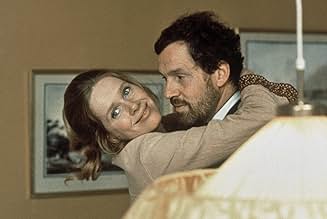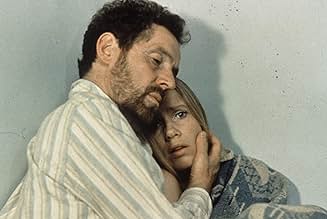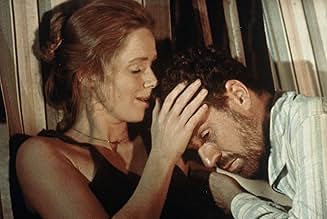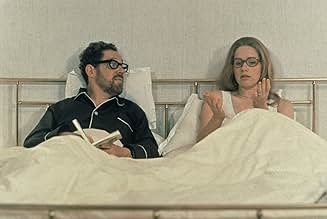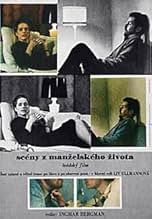IMDb RATING
8.5/10
18K
YOUR RATING
Ten years within the marriage of Marianne and Johan.Ten years within the marriage of Marianne and Johan.Ten years within the marriage of Marianne and Johan.
- Awards
- 3 wins total
Browse episodes
Featured reviews
There are few other films that have the direct authenticity of this one. It is very frank, honest, tender, and heartbreaking. The performances of the two primary actors are amazing. Never once did I doubt their sincerity. In every single scene they overwhelmingly conveyed the intense and nuanced emotions of the couple. I use the word "overwhelmingly" because that is exactly what it is. At times it is hard to watch. Especially the scene in which Johan admits his infidelity. I could feel Marainne's hurt/anger/confusion. There are moments of intense tenderness, as in the last scene where Johan comforts Marianne after her nightmare. To be sure, the actors had some incredible material with which to work. Bergman knows human nature as much as any of modern writer. His dialog is poetic at times, and achingly authentic at others. They way the couple eviscerates and dissects each other is alarmingly, yet honest. Rarely is a character saying what they actually feel. Rarely do the characters know what they feel. They, like many people, really are "emotional illiterates." Bergman's direction is minimal, and that is what makes it so effective. The emphasis is completely on the characters and their existences. This is a powerful, evocative film. And I have seen only the theatrical version. I can imagine the full TV version is even more detailed.
"Scenes From A Marriage" is quite simply that: we meet Marianne & Johan ten years into their union & we witness half a dozen scenes of their lives. I'm not married, but I have of course known many people, family & friends, who were married & who talked, acted, & lived much like this couple does. That they are well-educated & affluent is somewhat irrelevant - married couples often seem to be keeping a certain secret (some keep it better than others) that they disguise with contentment, ritual, obligation, affection. Most of the time they keep this secret even from themselves. This movie is about the gradual discovery of the two main characters of the nature & ramifications of that secret.
As far as Bergman films go, it's strangely pretty, in color, with two attractive leads. But I think perhaps Bergman (& Sven Nykvist) sought to give us a sense of familiarity with the suburban, middle-class surroundings to lure us into a false sense of the security of the marriage in question. Without giving anything away, I suggest that this film is no less dark & heavy than other Bergman films; it rather goes for the heart in the way that you often wish modern dramas about relationships would. It's not trite, nor contrived, nor easily resolved. It's wise as life.
The movie was edited down by Bergman from a six-episode television series, which comprise the "scenes." The cast is great, but it's Ullmann & Josephson's show, & Ullmann is such a magnificent actor that I marvel at her expressive face, which Bergman smartly keeps his camera on.
It's unbearably wise, & sometimes difficult, but there aren't many films out there as honest as this one.
As far as Bergman films go, it's strangely pretty, in color, with two attractive leads. But I think perhaps Bergman (& Sven Nykvist) sought to give us a sense of familiarity with the suburban, middle-class surroundings to lure us into a false sense of the security of the marriage in question. Without giving anything away, I suggest that this film is no less dark & heavy than other Bergman films; it rather goes for the heart in the way that you often wish modern dramas about relationships would. It's not trite, nor contrived, nor easily resolved. It's wise as life.
The movie was edited down by Bergman from a six-episode television series, which comprise the "scenes." The cast is great, but it's Ullmann & Josephson's show, & Ullmann is such a magnificent actor that I marvel at her expressive face, which Bergman smartly keeps his camera on.
It's unbearably wise, & sometimes difficult, but there aren't many films out there as honest as this one.
Ohmygod. Liv Ullman really deserved an Oscar for this one, as did Bergman. WOW- not many movies are this honest, this heartbreaking, this true, and this tumultuous- we see two people, in and out of a relationship over fifteen years, experiencing all the pain, loss, love, hate, anger, jealousy, denial, sadness, and so on that finding one's soul-mate brings, stretched out long-term.
Not many movies even come close to this one's brutality in its genuine awareness of people. Most modern films (and television, for that matter) cannot even come close to the psychological precision of Bergman's films. Perhaps "Scenes from a Marriage" is his best work- more accessible than "Wild Strawberries", more compelling than "Persona." This is definitely a film to seek out.
Not many movies even come close to this one's brutality in its genuine awareness of people. Most modern films (and television, for that matter) cannot even come close to the psychological precision of Bergman's films. Perhaps "Scenes from a Marriage" is his best work- more accessible than "Wild Strawberries", more compelling than "Persona." This is definitely a film to seek out.
10CSM126-1
Johan and Marianne have been happily married for ten years. Following the rough choice to abort their child, the marriage begins to fall apart. Theirs is a marriage of convenience anyway, so it is no surprise that they have looked elsewhere for love and comfort. One day, Johan runs away with another woman, and the process of divorce begins. "Scenes from a Marriage" (Scener ur ett aktenskap) is an intense and personal look at the sanctity of marriage in a world where divorce is in vogue.
"Scenes" begins with Johan and Marianne being interviewed for a magazine article about their perfect marriage. Johan is confident in his happiness. He loves his wife, has fathered two children, and has a well-paying job. Marianne is sure of nothing, other than that she's happy. She tries to talk about her future, but the photographer cuts her off for a picture. She never gets to finish her thought. One wonders what she would have said if she'd gotten to same amount of time to speak as Johan did.
During the course of an epic five-hour ride, the two will switch places. Johan will become uncertain of what he wants, and Marianne will become liberated and truly happy. It's what happens in between that fascinates. "Scenes from a Marriage" focuses on the in between moments in life. Most of the time there are only two characters on screen at a time. Filmed in an intimate, documentary-like style, the film gives us the feeling that we're watching a home movie about the down time in the couple's life. This is when they real emotions come to the surface. Johan reveals his passion for Paula, the woman who has seduced him away from Marianne. Marianne, reserved in public, let's her anger, pain, and jealousy flow freely when they are alone together.
It is this that makes the film work. The film was written and directed by Swedish master Ingmar Bergman, a man who knows how to create arrestingly real drama. Bergman knows that the little moments in life are utterly more fascinating then the overblown public moments that most movies show. By allowing us into these personal moments, Bergman allows Johan and Marianne to become like old friends to the viewer, and that makes the story all the more impactful.
The performances by Liv Ullman and Erland Josephson as Marianne and Johan are nothing short of revelatory. Let's face it, most actors don't shoot for the stars in television productions. Ullman and Josephson treat "Scenes" like any one of their theatrical films. This approach is much appreciated. I only wish they could teach American TV actors a thing or two. Ullman and Josephson deliver more meaningful and powerful performances in the course of five hours than half of the American network line-ups could provide in 5 seasons.
Take, for example, the scene where Marianne discovers that she is the last person to know about Johan's infidelity. The camera gets in close on Ullman's face to reveal all the little details of her expression. Ullman's face is a mask of horror and shame. Her eyes are crying out in despair much louder than her voice can.
There is another fantastic scene in which Marianne who, in the ultimate irony, is a divorce lawyer listens to a client discuss her loveless marriage. The comparison to Marianne and Johan's marriage is undeniable. The look on Marianne's face as she sees her future self in her client is hard to describe, but undeniably affecting.
Johan has less emotional depth, as one of the main plot points is that Paula saps the life out of him as the relationship progresses. However, look at the earliest scenes of the film, where he is overflowing with happiness. The joy in his eyes and his voice are so real it's hard to believe that the whole thing was carefully scripted by Bergman rather than improvised by Josephson.
It is said that, following the initial airing of "Scenes from a Marriage" on Scandinavian TV, the divorce rate in Scandinavia grew immensely. More surprising is that Ingmar Bergman was, and still is, delighted by this fact. The film does provide somewhat of an argument for staying together (Johan and Marianne bounce back and forth on th divorce issue several times) and ultimately, as far as I understand, says that even the most strained relationships can be helped. I suppose it is all up to individual interpretations.
I think that "Scenes from a Marriage" is a film about communication. The lack of communication, and the inability to communicate at all, are the major contributing factors in the breakdown of Johan and Marianne's relationship. It isn't until the divorce papers come that the communication begins. A lack of communication with their own emotions prevents the two from seeing any way out other than divorce--they simply assume that it's too late and that all is said and done. It doesn't have to be that way, and "Scenes from a Marriage" will provide a wake up call to anyone who thinks it does.
"Scenes" begins with Johan and Marianne being interviewed for a magazine article about their perfect marriage. Johan is confident in his happiness. He loves his wife, has fathered two children, and has a well-paying job. Marianne is sure of nothing, other than that she's happy. She tries to talk about her future, but the photographer cuts her off for a picture. She never gets to finish her thought. One wonders what she would have said if she'd gotten to same amount of time to speak as Johan did.
During the course of an epic five-hour ride, the two will switch places. Johan will become uncertain of what he wants, and Marianne will become liberated and truly happy. It's what happens in between that fascinates. "Scenes from a Marriage" focuses on the in between moments in life. Most of the time there are only two characters on screen at a time. Filmed in an intimate, documentary-like style, the film gives us the feeling that we're watching a home movie about the down time in the couple's life. This is when they real emotions come to the surface. Johan reveals his passion for Paula, the woman who has seduced him away from Marianne. Marianne, reserved in public, let's her anger, pain, and jealousy flow freely when they are alone together.
It is this that makes the film work. The film was written and directed by Swedish master Ingmar Bergman, a man who knows how to create arrestingly real drama. Bergman knows that the little moments in life are utterly more fascinating then the overblown public moments that most movies show. By allowing us into these personal moments, Bergman allows Johan and Marianne to become like old friends to the viewer, and that makes the story all the more impactful.
The performances by Liv Ullman and Erland Josephson as Marianne and Johan are nothing short of revelatory. Let's face it, most actors don't shoot for the stars in television productions. Ullman and Josephson treat "Scenes" like any one of their theatrical films. This approach is much appreciated. I only wish they could teach American TV actors a thing or two. Ullman and Josephson deliver more meaningful and powerful performances in the course of five hours than half of the American network line-ups could provide in 5 seasons.
Take, for example, the scene where Marianne discovers that she is the last person to know about Johan's infidelity. The camera gets in close on Ullman's face to reveal all the little details of her expression. Ullman's face is a mask of horror and shame. Her eyes are crying out in despair much louder than her voice can.
There is another fantastic scene in which Marianne who, in the ultimate irony, is a divorce lawyer listens to a client discuss her loveless marriage. The comparison to Marianne and Johan's marriage is undeniable. The look on Marianne's face as she sees her future self in her client is hard to describe, but undeniably affecting.
Johan has less emotional depth, as one of the main plot points is that Paula saps the life out of him as the relationship progresses. However, look at the earliest scenes of the film, where he is overflowing with happiness. The joy in his eyes and his voice are so real it's hard to believe that the whole thing was carefully scripted by Bergman rather than improvised by Josephson.
It is said that, following the initial airing of "Scenes from a Marriage" on Scandinavian TV, the divorce rate in Scandinavia grew immensely. More surprising is that Ingmar Bergman was, and still is, delighted by this fact. The film does provide somewhat of an argument for staying together (Johan and Marianne bounce back and forth on th divorce issue several times) and ultimately, as far as I understand, says that even the most strained relationships can be helped. I suppose it is all up to individual interpretations.
I think that "Scenes from a Marriage" is a film about communication. The lack of communication, and the inability to communicate at all, are the major contributing factors in the breakdown of Johan and Marianne's relationship. It isn't until the divorce papers come that the communication begins. A lack of communication with their own emotions prevents the two from seeing any way out other than divorce--they simply assume that it's too late and that all is said and done. It doesn't have to be that way, and "Scenes from a Marriage" will provide a wake up call to anyone who thinks it does.
Scenes from a Marriage (the TV version, even as the theatrical cut is still very good and worth the time if the only copy available) is an intimate, naturalistic portrait of a couple, who at first are seemingly happy, then aren't, then try and find out where they go wrong. It's involving drama at its nexus, and for those who love the theater it's an absolute must see (aside from the theme, no music, all talk). Johan and Marianne are two of Bergman's most interesting, true characters (among his countless others) that he's ever presented, and like many other film artists, you can tell he's lived through at least some if not most of the emotions and trials these characters have been through.
Along with several supporting characters, two of the more notable ones played by Bibi Andersson and Malmjso are a perfect contrast in the first episode of the series. The conflicts that are established throughout the series never pay-off in a mis-fire. Craft-wise there is almost no style except for the minimal lighting by the great Sven Nykvist. And the dialog that goes on between the two leads goes from amusing to tragic, from romantic to bleak, and with all the emotions that I (as one who's never been married) can only guess can be as so. Bergman's script would be just that, a poignant, very profound lot of bits between two people more or less on paper, if not for Liv Ullmann and Erland Josephson. They turn on the emotions intuitively, like they've been these people somewhere else at some other time. Or rather, the husband and wife don't have very complicated jobs or economic situation, but the problems lie on the emotional plane, and the intellect they try to put to it. Johan loves another woman, how does that affect Marianne? Marianne asks for a divorce, how does that affect Johan? What will they do to cope? These are questions Bergman poses for his actors, among plenty of others, and they pull off the emotional cues off of each other like the most wonderful theatrical pros.
It's hard to find anything wrong with their acting, cause they don't over-do it (unless you're not into Marianne's changes in feeling in some scenes, which could be understandable), and the bottom line is that despite it being in Europe thirty years ago, it's highly possible these people could be in your house, or in your neighbor's house. Ullmann's Marianne is the 180 of her character from Persona, who could only let out emotions once or twice, mostly as an observer. Josephson's Johan is complex behind is usually sarcastic and simple demeanor- what drives him to do what he does in episode three, or in four? What will the conclusion lead to? Bergman creates a drama that is never boring, never diluted, and asks us to search for ideas about love and relationships we sometimes try and push away. It's a superb, concise treatise about the nature of falling in and out of love, how to differentiate what love is, and essentially what a marriage is. I can't wait to see the sequel, Saraband, which is Bergman's (definite) last film.
Along with several supporting characters, two of the more notable ones played by Bibi Andersson and Malmjso are a perfect contrast in the first episode of the series. The conflicts that are established throughout the series never pay-off in a mis-fire. Craft-wise there is almost no style except for the minimal lighting by the great Sven Nykvist. And the dialog that goes on between the two leads goes from amusing to tragic, from romantic to bleak, and with all the emotions that I (as one who's never been married) can only guess can be as so. Bergman's script would be just that, a poignant, very profound lot of bits between two people more or less on paper, if not for Liv Ullmann and Erland Josephson. They turn on the emotions intuitively, like they've been these people somewhere else at some other time. Or rather, the husband and wife don't have very complicated jobs or economic situation, but the problems lie on the emotional plane, and the intellect they try to put to it. Johan loves another woman, how does that affect Marianne? Marianne asks for a divorce, how does that affect Johan? What will they do to cope? These are questions Bergman poses for his actors, among plenty of others, and they pull off the emotional cues off of each other like the most wonderful theatrical pros.
It's hard to find anything wrong with their acting, cause they don't over-do it (unless you're not into Marianne's changes in feeling in some scenes, which could be understandable), and the bottom line is that despite it being in Europe thirty years ago, it's highly possible these people could be in your house, or in your neighbor's house. Ullmann's Marianne is the 180 of her character from Persona, who could only let out emotions once or twice, mostly as an observer. Josephson's Johan is complex behind is usually sarcastic and simple demeanor- what drives him to do what he does in episode three, or in four? What will the conclusion lead to? Bergman creates a drama that is never boring, never diluted, and asks us to search for ideas about love and relationships we sometimes try and push away. It's a superb, concise treatise about the nature of falling in and out of love, how to differentiate what love is, and essentially what a marriage is. I can't wait to see the sequel, Saraband, which is Bergman's (definite) last film.
Did you know
- TriviaAccording to an interview with Ingmar Bergman, after the TV mini-series was broadcast in Sweden, the divorce rate in Sweden increased substantially and the number of married couples who seek marriage counseling also doubled.
- Crazy creditsThe end credits aren't shown on-screen but read by director and writer Ingmar Bergman, while "a beautiful picture of Fårö" is shown (different for each episode). Bergman himself is not credited at all.
- Alternate versionsBergman prepared a four-hour version of "Scenes from a Marriage," hoping it would be shown as a two-part film. It never appeared in the US, although the original six-hour mini-series was shown on PBS after the 168 minute cut had played theatrically.
- ConnectionsEdited into Scenes from a Marriage (1974)
- SoundtracksConcerto for violin, strings & continuo in B flat major, Op. 10, No. 1
(uncredited)
Written by Tomaso Albinoni
A short extract is played during the very beginning and end of each episode (it's not featured in the theatrical version)
- How many seasons does Scenes from a Marriage have?Powered by Alexa
Details
- Release date
- Country of origin
- Official site
- Language
- Also known as
- Szenen einer Ehe
- Filming locations
- Production company
- See more company credits at IMDbPro
- Runtime
- 50m
- Sound mix
- Aspect ratio
- 4:3
Contribute to this page
Suggest an edit or add missing content

